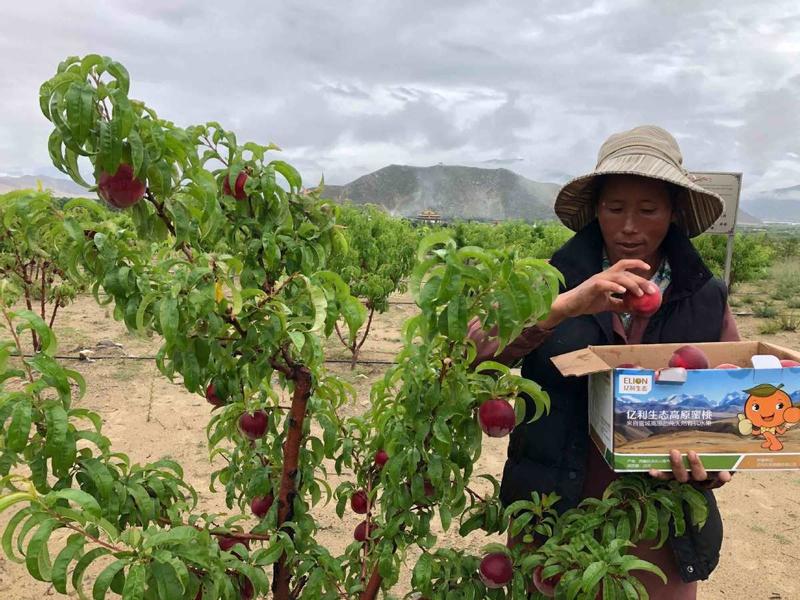 Metok Pema picks peaches at the orchard, which provides a stable job and contributes to her family's income. (PALDEN NYIMA / CHINA DAILY)
Metok Pema picks peaches at the orchard, which provides a stable job and contributes to her family's income. (PALDEN NYIMA / CHINA DAILY)
Before 9 am every day, Metok Pema rides her electric bicycle to work at an orchard, carrying a pair of gloves and a spade.
With an investment of more than US$6 million from Elion Resources Group, the orchard covers 90 hectares of sandy land and grows fruits such as nectarines and peaches
The 42-year-old farmer is pleased to work at the orchard as it is a stable job and is only a 15-minute ride from her home in Samye village, in Dranang county of Tibet autonomous region.
"In the past, I had to travel long distances to find work. It was not convenient," Metok Pema said. "But now my job is near my home, I can better handle both housework and farming."
ALSO READ: Mountain county tackles poverty with tourism
The orchard, opposite Hepori Mountain, one of Tibet's sacred Buddhist mountains, and Samye, the oldest Buddhist monastery in Tibet, started operation in 2017 as a poverty alleviation project with support from the local government. Since then it has generated income for villagers and helped protect the environment.
With an investment of more than 40 million yuan (US$6 million) from Elion Resources Group, a private company based in Beijing that focuses on eco-friendly industry, the orchard covers 90 hectares of sandy land and grows fruits such as nectarines and peaches.
Jobs for farmers
The project has provided jobs for 500 farmers from Samye township, including 15 from Metok Pema's village, which shares the same name. Since it commenced operation, the orchard has paid employees more than 4 million yuan (US$582,000), with each worker earning 160 yuan for a day's work.
Metok Pema and her husband grow barley, peas and potatoes for food, and they needed to work part time at construction sites before she joined the orchard in 2017. She said she has made an average of 20,000 yuan a year since 2017.
"My main work includes watering the trees and management of the orchard. The work is not heavy," Metok Pema said.
A stable income has improved the family's living conditions. Metok Pema said she can buy more daily necessities for her family now, while in the past, she couldn't afford an electric bike.
"I used to borrow money to support my daughter in college. But now I have enough money," she said. "After working in the orchard for three years, I have learned some basic tree growing skills. I've also planted some trees at home, and they're growing well."
Tsering Choedron, a fellow villager who has worked at the orchard for four months, said it was within walking distance of her home and had proved to be the perfect solution for increasing her family's income.
Her daily work includes watering the plants and weeding.
"The salary is not bad," she said. "The main point is that it is very close to my home so that I can better manage my housework.
"With extra income added to earnings from farming and other work, I can take better care of my two kids and support my family's financial needs."
Village benefits
Lei Feng, Party secretary of Dranang county, said the orchard is one of the county's poverty alleviation projects and has contributed to poverty reduction by providing job opportunities for local people.
Lei said Samye township was lifted out of poverty in 2017, with Dranang county following suit the next year.
"The land belongs to the village collective. By renting it to the enterprise that operates the business, the whole village can benefit from it," Lei said.
He said another main goal of the orchard project is to control the area's severe desertification by planting trees and flowers.
"Before the orchard project started, this place was very sandy and it affected people's health and work," Lei said. "Now the situation has greatly improved with the planting of flowers, grass and trees."
He said the orchard also provided seedlings that villagers could plant at home. In the future they would be able to earn extra money by selling the fruit.
READ MORE: China makes headway in poverty relief through culture, tourism
Hu Richa, an Elion Resources staff member who is responsible for the project, said the orchard site was a desert before 2017. It now produces more than 20 kinds of fruit.
"We did much fieldwork and research to make sure the trees bear fruit," he said. "We also encourage the villagers to plant the trees at home, so we can buy their fruit in the future.
"Our company is experienced in desertification management and growing fruit trees. By involving local villagers in the project, our goal is to benefit them by increasing their incomes while protecting the fragile environment."
Contact the writers at palden_nyima@chinadaily.com.cn


